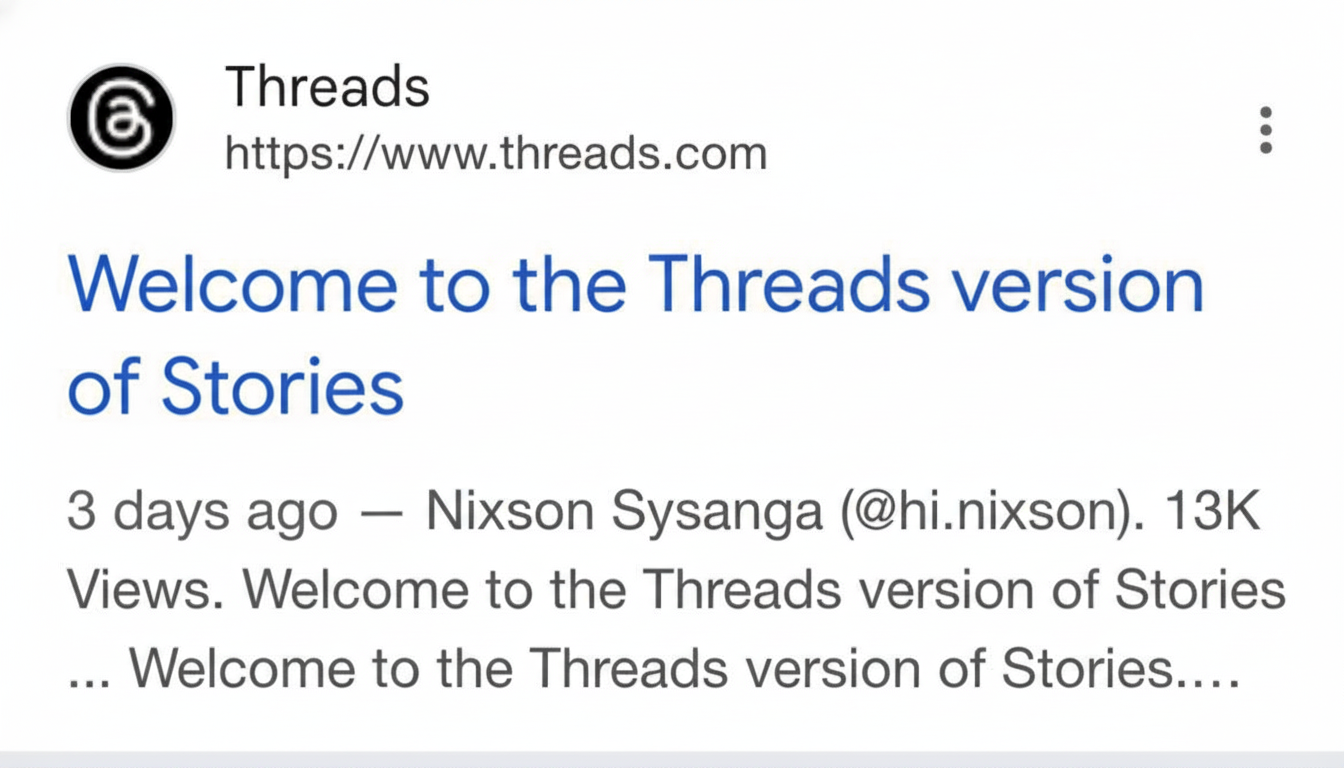Threads’ new “ghost posts” are supposed to disappear in 24 hours. But some users discovered that vanishing updates still existed on the web, including in Google’s search results, suggesting that content wasn’t entirely gone — just gone from Threads.
Meta Says a Bug Let Expired Posts Surface
Meta confirms that there was a bug that briefly showed ghost posts in web search results even after their expiry. Meta further assures its users that the glitch has been fixed and that ghost posts will only be visible to the user in the thread on the mobile app. The company says the bug was short-lived, and the indexing error was minor rather than a significant incident. The fact that Threads posts live publicly on web URLs while active was a major reason search engines such as Google could easily cache them.

How Ghost Posts Ended Up in Google Search Results
Search engines index what they crawl, and if a page is not restricted — such as with noindex tags — search bots will access that page and add it to search results. Google explains that removals happen either upon recrawl or submission of removal requests; otherwise, cached data might persist for a while even when changes or disappearances occur.
In practice, what this means is that a post that lives for half an hour can still leave a mark. If Google’s crawler saw a Threads ghost post while it was live, a cached entry can continue to exist in Google’s index until Google refreshes or purges that index entry. This would explain why users saw snippets and cached evidence of ghost posts but then ran into an error page when attempting to click through: the post was deleted on Threads, but the search index hadn’t been cleared.

Not all of these posts appeared in search — as expected, crawl rate varies by page and URL, and most pages are never indexed at all. Their sparse sightings can also be explained by ranking: Google may have only seen a subset of live ghost posts before they expired, and Meta’s fix likely involved disabling indexing of such posts going forward. Ephemeral content interacts with web infrastructure in this straightforward way. Deleted tweets and Telegram posts have long been exposed to search caches or Twitter archives. Messaging apps’ selling point of disappearing posts invites people to take snapshots. Privacy expectation surveys from EFF and others have repeatedly pointed out that “disappearing” almost never equates to being unarchived. Technical options to prevent indexing abound. Noindex tags, X‑Robots‑Tag headers, ephemeral HTTP caching, and signed URLs are all available, as is complete control over whether the public view of a transient post contains any indexable data. Nonetheless, all it takes is a brief window of public availability — minutes — for a crawler or scraper to take a flyer.
What Meta’s Fix Likely Involves to Stop Ghost Posts in Search
Meta didn’t publish implementation details, but a plausible remediation includes adding noindex directives to ghost post URLs, adjusting robots rules on Threads’ web endpoints, tightening cache-control headers, and ensuring expired posts return hard 404 or 410 status codes. Google has said that 404/410 responses, combined with noindex signals, help nudge faster removal on recrawl. These steps aim to reduce both fresh indexing and the lifespan of cached remnants — though even here, residual entries can hang around until the next crawl or cache refresh. Search removal tools and “remove outdated content” workflows can speed that process, but full propagation is not instantaneous.
What Users Should Do Right Now to Protect Ghost Post Privacy
- Treat ghost posts as public statements while they are live. If you wouldn’t publish it to a permanent feed, think twice before posting.
- Keep profiles private if you want stronger barriers to crawling. Private content is typically not served to unauthenticated crawlers.
- Assume screenshots and third-party scrapes can circulate. Ephemerality is a user-interface promise, not a guarantee of erasure.
- If a post appears in search after deletion, use the search engine’s “remove outdated content” option to request faster cleanup. Platform-level fixes help, but user-initiated requests can accelerate the process.
Why This Matters for Threads and Search Reliability and Trust
Threads is in the fight for live discussions, in which spontaneity promotes involvement. Features that prompt at-the-moment participation are valuable, as long as users can trust the rails. Following the mishap with “vanishing” posts appearing in Google search results, the malfunction has been addressed. This concentrates the onus on Google, wherein the brutal realities of that layer cannot be ignored. Remember, the web is wide open, and each site should be marked by publishers lest it be seen. People must be alerted — their posts can vanish on Threads, but on the web, their content may remain visible.

